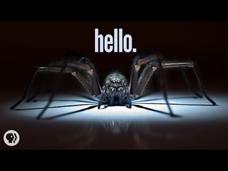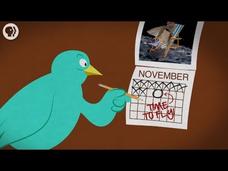Be Smart
%$?# Allergies!
About 40,000 people have sinus surgery every year, hoping to relieve sinus congestion due to allergies. Learners see why some people have allergies and others don't. From flowers' pollen to pet dander, some human immune systems are...
Be Smart
Why Do We Have To Sleep?
Humans are the only mammals who delay sleep. Viewers learn this and other interesting facts in a video that explores sleep in humans. The narrator also discusses how lights affect our sleep, the importance of sleep, and how sleep is...
Be Smart
Rise of the Superbugs
The narrator of a short video shows learners the history of antibiotics with the use of penicillin. Viewers then see how bacteria are becoming resistant to antibiotics and what that means for our future health and for the development of...
Be Smart
Why I'm Scared of Spiders
Eighty-four percent of people have an irrational fear. This video focuses on a fear of spiders. It explains the different types of fear, the conditioning that creates fear, and the evolutionary advantage to these fears. It doesn't just...
Be Smart
How Atom Bombs Can Uncover Forged Art
Art forgeries are works of art themselves? How can inspectors tell real art from fake? A video from the a large science playlist explores the techniques practiced by expert forgers and the subtle science behind telling a masterpiece from...
Be Smart
How Some Words Get Forgetted
There's nothing regular about them—irregular verbs turn out to be the most common verbs in the English language. Through an analysis of data, learners discover that Zipf's Law describes the patterns of word usage.
Be Smart
The Physics of Space Battles
Ready to take your class on a journey through space and witness epic battles? A video segment portrays the true way space battles happen, complete with the way Hollywood handles the lack of gravity, even while firing missiles at the...
Be Smart
The Sun Is A Magnet!
Attract learners to science by studying largest magnet in the galaxy. The video explains why the sun is technically a magnet and how the magnetic fields causes solar storms. It also covers the effects of solar storms on the earth such as...
Be Smart
What's the Deadliest Animal in the World?
Do you know what animal causes more than one million deaths each year? This terrifying animal and how it causes so much death is the subject of a video that also shares how humans can avoid it and the research scientists have conducted...
Be Smart
The Strange Science of the Placebo Effect
Scholars see how doctors first used placebos to help soldiers during WWII with pain. Viewers then see what placebos are and how effective they can be. The narrator reminds viewers that while placebos cannot cure everything, their...
Be Smart
Where Do Birds Go In Winter?
The poet Homer believed that birds went to battle tribes of goat-riding dwarfs during the winter. As the video explains, this myth and many others that seem crazy to us now, wasn't questioned for many years. The reality isn't quite as...
Be Smart
Asteroids, Meteors, Comets… and the End of the World?
Dinosaurs owe their destiny to an asteroid. What are the chances humans will meet the same fate? A fascinating video lesson considers the probability of an asteroid colliding with the earth while taking into account variations in...
Be Smart
Is Space a Thing?
Travel through time to learn from some of the world's greatest scientists. The narrator of a thought-provoking video investigates the theories of Newton, Mach, and Einstein among others to determine if space itself is a thing. Viewers...
Be Smart
Asteroid Mining: Our Ticket To Living Off Earth?
It turns out asteroids could be a gold mine—literally! An It's Ok To Be Smart video lesson describes the untapped resources orbiting our solar system. The presenter considers the possibilities of space colonies using these resources as...
Be Smart
Why Is The Universe So Empty? (ft. PHD Comics!)
Explore the structure of the universe! An educational video demonstrates the gravitational consequences of different astronomical structures. The presenter starts with the creation of the universe and explains how energy and forces...
Physics Girl
Strange Sand Acts Like Liquid
Can you use a solid to study fluid dynamics? You bet! Science scholars examine the process of fluidization with a video from an extensive physics playlist. The narrator demonstrates and explains how the uniform movement of air causes...
Physics Girl
Could You Replace Your Eye with a Camera?
Eyeballs or cameras—which have the best functions? The video presentations compare the important functions of the eyeball and the camera. As technology changes, cameras become more impressive, but the eyeball still out-functions the...
Be Smart
The Most Extreme Life Forms on Earth… and Beyond?
Earth's strangest creatures may be the key to finding life on other planets! Introduce biology scholars to the extreme world of extremophiles with a video from a large science playlist. From the depths of the ocean to the heart of the...
Be Smart
Tuatara All the Way Down: Face to Face with a Living Fossil!
Change is good ... unless you're a tuatara! Meet Earth's oldest surviving reptile species in a fun video from an extensive science playlist. Content includes why the tuatara did not evolve and its unique anatomy.
Be Smart
Why Are There as Many Males as Females?
From anteaters to zebras, why are both sexes equally represented in number? Explore a quirk in evolution with a video from a thought-provoking science playlist. The narrator shows examples of species that might only need a few males,...
Be Smart
Can You Bend Light like This?
Looking for instruction that seems more like wizardry? Look no further! Show your scholars some pretty amazing light experiments using a video from a comprehensive science playlist. The narrator performs and explains three simple yet...
Be Smart
97% of Climate Scientists Really Do Agree
Why do some people still question climate change? Discover the components of consensus with a video from a well-written science playlist. The narrator guides viewers through the process of reviewing climate publications, how exclusive...
Be Smart
Why Do We Itch?
Our skin is the first line of defense against insects, parasites, and other irritants. How do we defend it? Step inside the science of scratching with a video from an informative playlist. Topics include how itching evolved, what happens...
Be Smart
The Cosmic Origins of Earth's Water
Was Earth born as a Blue Planet? Discover where water came from with a video from an intriguing science playlist. The resource covers the three most likely origins of water, how scientists differentiate between comet and asteroid water,...

























